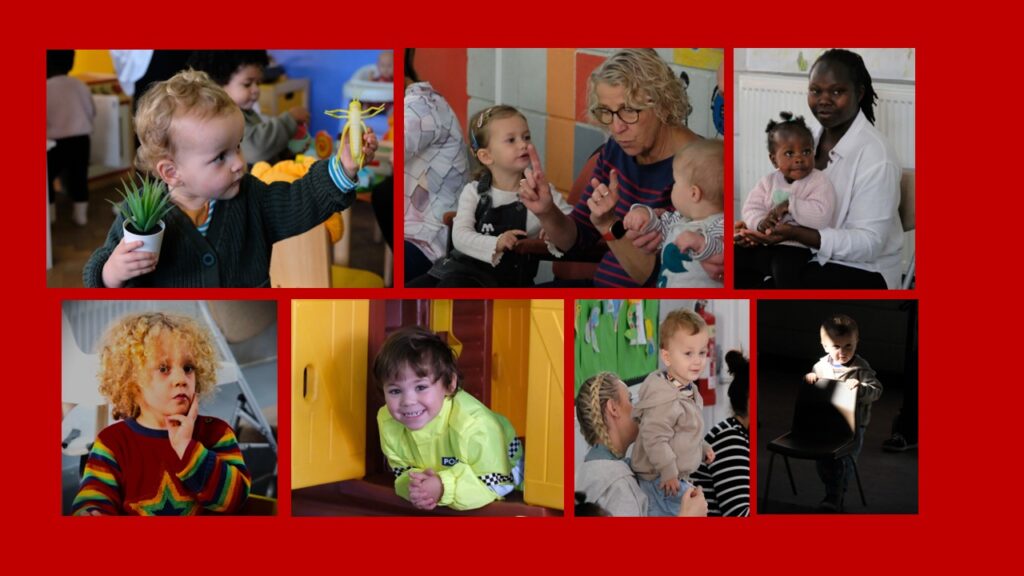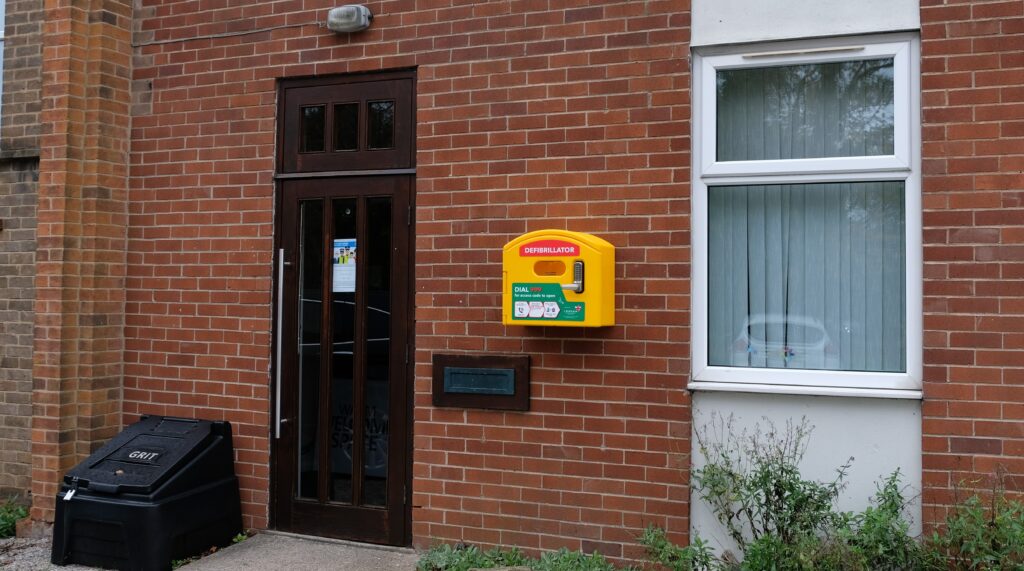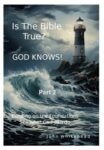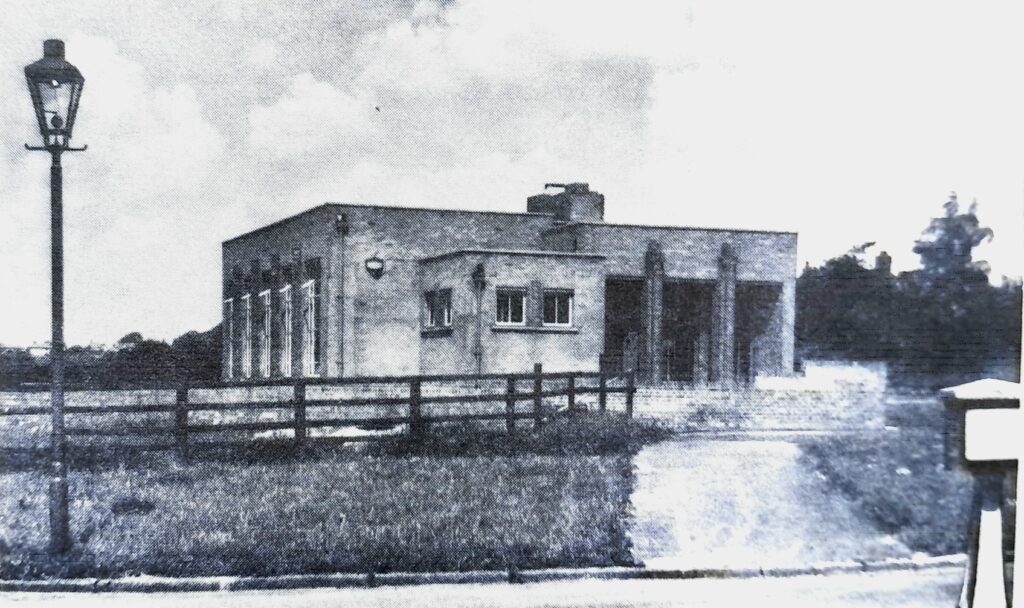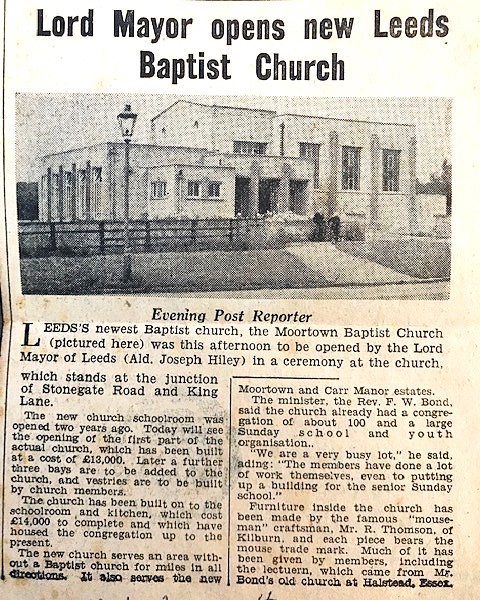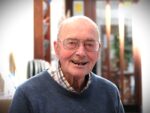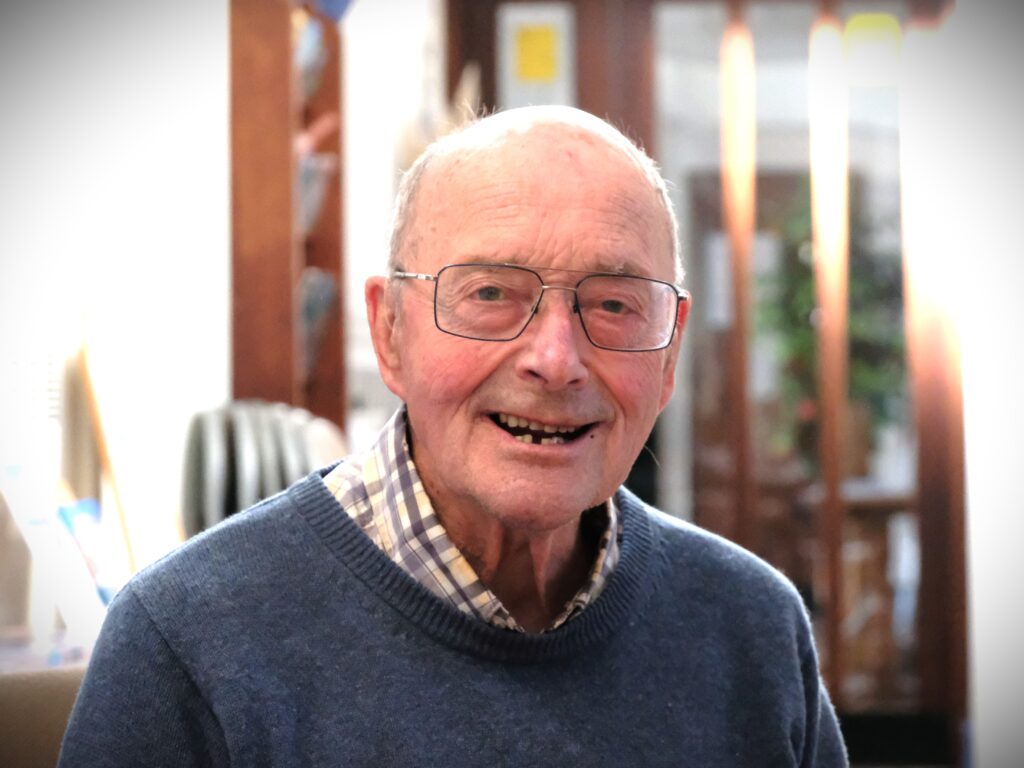Is The Bible True?
God Knows!
Part 2
For extra copies of this booklet or if you have any comments or queries, feel free to contact me at
jdwhitehead1938@gmail.com
Acknowledgements
Many thanks to Anthony Richardson for the cover design.
And special thanks to my son Paul, without whose help and encouragement the project, having been abandoned, would never have got off the ground.
Not least I thank my wife Ruth for putting up with my extended absences from being available for the day-to-day activities of normal living.
Thanks too to Book Printing UK for their suggestions and guidance in producing the final layout.
C O N T E N T S
Chapter 1 Introduction 3
Chapter 2 2000 Years of History 4
Chapter 3 Some Lessons along the Way 9
Chapter 4 God’s Spokespersons – The Prophets 12
Chapter 5 The Spirit of God 15
Chapter 6 Conclusion 17
Chapter 1
Introduction
Writing this, the second booklet of the series, presents a real challenge. It covers the remainder of the Old Testament from Abraham to Jesus, some 2000 years of detailed history – political, economic, social and not least, religious. It is about the one people group which grew from one family to become the Jewish nation. Continuing the lighthouse theme, it builds on the foundations set down in Part 1, providing the building blocks.
Although this has been written as Part 2 of a 3-part series it can be read as a stand-alone booklet. Part 1 looked at the interpretation of a number of things that at first sight seemed implausible. Was the universe really created in seven days? Was there a major flood which covered almost the whole land mass? Did a whale really swallow Jonah? Secondly it began a theme which continues throughout the whole series – that is looking at God’s nature, the nature of humankind, and their inter-relationship, still bearing in mind the questions of Rudyard Kipling – the who, what, where, when, why, and how.
But the biggest challenge, beginning with Abraham and ending with the birth of Jesus, is to respond to the question, what lessons can I learn from a 2000-year-old document? What’s in it for me? In responding I am reminded of an old French proverb. “The more things change, the more they stay the same.” History repeats itself. What happened
then is still happening all around us. Human greed and envy; the lust for power both individually and by governments; wars and conflicts; pain and suffering. It’s all about money, sex and power. I’m sure I don’t need to go on. So read on and hopefully learn the lessons from the past that there is an alternative. The remedy then is still the remedy now. God spoke to his people then. Still, he speaks to those who will listen. In addition to the offer of life in all its fullness, as introduced in the first booklet, we have the promise of a future going beyond the end of our life on earth. So, what’s in it for me? God Knows!
Chapter 2
2000 Years of History
The Promise
It all started with an unconditional covenant promise to one man Abraham, 2000 years BC. God said to him, “Leave your country, your people and your father’s household and go to the land which I will show you. I will make your offspring into a great nation, and I will bless you, and you will be a blessing. And all nations will be blessed through you.” However, the remainder of the Old Testament sees only the first part of this promise fulfilled. Fulfilment of the second part was initiated by Jesus and is ongoing to the present day. Jesus – the one person who changed the whole course of history, through whom all nations, all and every individual person may be blessed. This will be covered in the third booklet.
We have one word here, bless, which is easy to overlook. If we are blessed, it simply means being favoured by God. If we say God bless you, it is asking for God’s help and protection. The connotations here are joy which is true happiness, contentment. Like getting into a hot bath after a period of extreme exertion, or perhaps achieved in an extremely happy marriage, or a loving relationship with God. But all this is in need of a lot of further unpacking.
The journey progresses through this one family. As we will see there are many challenges along the way, many hurdles to be overcome, and a few surprises.
The Life of Abraham
So we begin the narrative with Abraham, a descendant of Noah, who with his family had always regarded God as the one true God. They were semi-nomads, living on the fringe of society in Mesopotamia (corresponding roughly to present day Iraq). Never in one fixed place for long, they moved to find grazing for their livestock and areas to grow crops.
At the age of 75, obedient to that promise, Abraham with his wife Sarah and all his family, with all their possessions, travelled West towards Canaan.
En route they visited the town of Sodom, renowned for their vile and degrading unnatural sexual practices and bestiality prevalent in the whole area, giving its name to our term Sodomy. I don’t think I need to go into any more detail here. They stayed a short while. Shortly after they left, there was a violent explosion and the whole area, including the population, was completely reduced to rubble. Here is a reminder, explored in the first booklet of the power and judgement of God.
But did the destruction of Sodom really happen? Archaeology does provide evidence of the destruction of cities by fire in the area described in the bible passage, moreover in the right timeframe. It can be explained by a massive explosion, similar to one recorded in Russia when in 1908, a massive blast near Siberia’s Stony Tunguska River flattened some 2,000 square kilometres of uninhabited Taiga forestry. Curiously, no crater was discovered and scientists explained the strange phenomena as a meteor having exploded some 5-10 km above land. So the destruction of Sodom was a natural event, but it was miraculous that it happened at the time of God’s choosing.
They continued westward arriving in Canaan, (Canaan corresponds roughly to modern day Israel), where they stayed living as before as nomads. God said, “to your offspring I will give this land”.
Abraham’s Wife Sarah – How God makes Nobodies into Somebodies
A key theme throughout the Old Testament is how God uses nobodies and makes them into somebodies. He is looking for potential. He sees the potential inherent in each one of us. Not what we are, but what we can become.
When we look at Sarah, in the eyes of society, she really was a nobody. Not only a woman – all women were considered second class citizens – but she was barren, unable to have children. Being unable to have children was considered a disgrace in that culture. And there were no fertility clinics, no IVF and the like, to help couples in their yearning to have children.
How could her husband Abraham become the founder of a great nation? She thought she had the answer. She invited him to have a child through her servant girl, which he did and Ishmael was born. (This was an accepted practice in that culture). Thus, at the age of 86, Abraham had a son who was named Ishmael.
Ishmael became the forefather of the Arab nations. But that was not what God had in mind. He told her that she would have her own child. Not surprisingly, Sarah laughed! Her response was something like “Can I enjoy sex at my age? Come on – I’m 85 and had my menopause decades ago”. But that is what happened and at the age of 85 with Abraham now 99 she gave birth to Isaac. What a precious and miraculous gift.
We must remind ourselves that God can work – and still does work – in ways we do not understand. And in his own timing too.
I can’t hope to do justice to the story in just so few words. You can read the full account in Genesis chapters 16-21.
The thrust of the story carries on through his son Isaac.
Isaac and Rebekah
Isaac marries his cousin Rebekah. But Rebekah was barren. Here we go again!
Try and imagine the painful prayers as decades passed with no offspring. Does God hear me? Does God even care about my cry for answers or signs? Will I have to wait until I’m 90 years old like Sarah before I have a child?
It took 20 years of prayer and trying before she gave birth to twin boys, Jacob and Esau. Here is a reminder of what can be achieved through prayer, and also that patient and fervent prayer is often needed. I have a friend who prayed for 40 years for her son to become a Christian before that prayer was answered.
Isaac’s son Jacob had 12 sons and 1 daughter through his two wives – Leah and Rachel, and their two maidservants. Inevitable questions here, answered in Genesis chapters 29 and 30.
Again, Rachel, Jacob’s favourite wife was unable to conceive. She had to wait 14 years before she became pregnant. That’s 3 consecutive generations of infertility being overcome, again through prayer.
The narrative continues through Rachel’s first son, Joseph.
The Life of Joseph
Joseph’s brothers were jealous of him because he was the favourite. At the age of 17 Jacob sent him out into the field to check on the other sons. Out of their jealousy they considered killing him but instead sold him to some passing traders who in turn took him to Egypt and sold him as a slave to the Palace Guard. But there he found favour and became head of the government.
The whole area became subject to 7 years of plentiful harvests followed by 7 years of drought, of which Joseph had been warned in a dream. So in this time of plenty, Egypt had built up vast storehouses of grain and as the drought took over, all the neighbouring countries including Jacob’s family, came to Egypt to buy grain. The poignant comment of Joseph to his brothers was, As for you, you meant evil against me but God meant it for good, to bring it about that many people should be kept alive, as they are today.
There was family reconciliation and the whole family was invited to stay and settle in Egypt.
What can we learn from this? What does this mean for us today? Family breakdowns are all too common, but breakdowns invite restitution and reconciliation, after which relationships often become stronger. But not least, suffering produces endurance and builds up strength of character. Moreover, having overcome difficulties ourselves we can be a help to others in similar circumstances.
In Egypt the family grew to such an extent that out of fear of being overrun they were taken into slavery.
Escape from Egypt
After some 400 years of cruel servitude, God raised up a new leader Moses who eventually led them out of slavery where they escaped from the pursuing Egyptian Army as far as the Nile delta. The waters parted long enough for them to cross into wilderness area to the south and west of Canaan but flowed again, drowning the pursuing Egyptian army.
Reality Check
This is probably one of the best-known bible stories and the focus of a number of movies over the years. Not as depicted by Cecil B. De Mille in his epic movie of the 1960’s, with walls of water standing at the sides making a passage on dry land, but a strong wind causing the waters of the Nile delta to part. When they had all crossed, the wind subsided, the waters returned, trapping the Egyptians. It was not the parting of the waters that was miraculous, as it has happened at various times since then, but that it happened just at the right time for the Hebrews who were escaping.
Historical records do agree that a large population of Hebrews did dwell in Egypt, later crossing the river Nile, and spending time in the “wilderness” area on the eastern side of the river. How did they cross on dry land? Such a phenomenon is observable in the present age. A strong wind would cause the sea level to drop leaving dry land.
Researchers have observed this in the past in the Nile Delta itself in the year 1882. This also has happened in Lake Erie, and it has happened in other places as well.
In the Wilderness
After 3 months in the wilderness Moses went alone up Mount Sinai to meet God personally. There he received the 10 Commandments, which he brought back to the people on “tablets of stone”.
The first commandment stated, “You should have no other gods but me”. But the worship of other gods was rife. Baal was a shorthand for a number of false man-made Gods. Baal worship, in summary, looked a little like this. Adults would gather around the altar of Baal, and would include child sacrifice. Infants would be burned alive as a sacrificial offering to appease the deity. Amid horrific screams and the stench of charred human flesh, they would engage in bisexual orgies.
Moses was gone 40 days and in that time the people thought they had been deserted. So they persuaded Aaron, Moses’ brother, to fashion a golden calf out of gold items plundered from the Egyptians before they fled across the Red Sea, and said “this is the god who brought you out of Egypt”. So, Aaron built an altar before the calf and declared a feast day. They would gather round it with dancing, feasting and indulgent drinking. In other words, they were having a good booze up with drunkenness and all the indiscretions which followed. On his return Moses was furious and threw the tablets of stone on the ground and they shattered into pieces. In his anger he took the golden calf, melted it on the altar they had prepared, ground it to a powder, scattered it on the water and made them drink it. No half measures there! At a later stage, Moses went back to the mountain and returned again with the Commandments.
The 10 Commandments, which provided and still provides today a basic framework of guidance both for day-to-day living in democratised countries and also instructions of God’s requirements for our regard of him. The first four relate to our relationship with God, the rest to the way we conduct our lives.
This diversion together with acknowledging other man-made deities was an ongoing feature of the progress (or otherwise) of the Jewish Nation. They were continually confronted and challenged and warned of the dire consequences by God’s spokespersons, known as Prophets, who were bringers of God’s messages to the people.
They could have entered their “Promised Land” after just a year, but lack of trust in their leader resulted in their being made to remain in that wilderness for 40 years until most of the adult generation had died, but God during that whole time continued to oversee that their needs were satisfied. It was Moses’ successor Joshua, who led them across the River Jordan into Canaan, the Promised Land.
In the Promised Land
After years of battles, they gradually overcame the then inhabitants. A succession of leaders brought them to becoming a unified Kingdom. It was King David, described as the Great Leader who finally saw the conquest of the whole country.
But the kingdom did not last. Firstly, it split into two, Israel in the North with ten tribes and Judah in the South with two. But even that did not last. Around 200 years after King David’s reign, the Assyrian army from the north swept through, taking the people in the northern kingdom into exile. Judah did not fare much better, being conquered by Babylon, who under King Nebuchadnezzar ransacked the temple, carrying off all its treasures. Later they were seen to have been abandoned for a period of 400 years, bringing us to the birth of Jesus.
This gives a picture of the whole 2000 years condensed to just a few pages. It goes without saying that each episode, each character, could be and has been expounded to cover whole chapters, even volumes.
I have been deliberately brief in this section, but we have seen this covenant failed due to the lack of commitment and waywardness of the Jewish people.
Chapter 3
Some Lessons Along the Way
I have selected just a few characters who highlight important aspects of our relationship with God.
A Lesson from Rahab
Before crossing the Jordan, Joshua secretly sent two spies into Jericho and they went to the house of prostitute Rahab for lodging, information and/or sex. But it came to the attention of the king of Jericho, and he sent messengers to Rahab to bring them out. But Rahab had hidden them to avoid their presence being discovered and lied, saying that they had already left. They escaped the following morning.
Rahab is an interesting character. Looking into her background, she was aware of the Israelite escape from slavery, and the promise that God would give them the land. But as a woman she was triply marginalised in the eyes of the Jewish people. Rahab was a woman, and as a Canaanite was an outsider, and in addition she was a prostitute. But because of her kindness and belief in the Israelite identity in God’s plan, she and her family were spared from the destruction of Jericho which followed. Despite her past mistakes, God used her, and she and her family became part of the Jewish nation. In spite of her identity, God could see into her heart. In fact, she is an ancestor of Jesus, being the great, great, great, great, grandmother of King David.
Rahab risked her own life to help the two spies. She put her trust in God and took a risk to help God’s people. Rahab reminds us that we can take risks for God, no matter how frightening or intimidating they may be.
What we can observe from this account is: –
- God accepts those with a No matter what wrong things, harmful things we may have done, we will never be rejected by God, if we come to him.
- God can use those with a He has a plan for each and every one of us.
- God redefines those with a From harlot to bride. From bride to mother. From mother to an ancestor of Jesus.
Lessons from David – From Shepherd Boy to King
David is one person whose life is worth following, as it encapsulated in one person the general theme of this series. It begins with his being chosen and anointed as a future king through the prophet Samuel.
Samuel
Samuel’s mother Hannah was childless and she prayed to God for a son. So Samuel was born. In gratitude she dedicated him to the service of God from birth.
In his adult life he was called by God to choose and anoint one of the eight sons of Jesse to become the next king. Seven were called before Samuel, the strong, the tall, the handsome, but each was rejected. He asked if these were all of his sons. Jesse replied that the youngest one was tending the sheep. So, David was then called. He is described as having a ruddy complexion, handsome and with fine features. Samuel then said that he was the one, and thus David in this private act was anointed as a future king of Israel. In spite of this, he remained with his family as one who tended the sheep.
He developed skill as a musician as a harpist.
David and Saul
David’s musical skills came to the fore when Israel’s king at that time was Saul. Saul had what would be described today as having mental health problems and so David was called to soothe him.
David and Goliath
We now come across another well-known character, Goliath. Confronting the Philistines in Saul’s quest to conquer the whole of Canaan, their champion Goliath who was described as a giant of a man, challenged the Israelites to send one man to fight him and the loser would be subservient to the other nation. The full account, well worth reading, is found in 1 Samuel chapter 17. The essence of the story describes Goliath, armed to the teeth and wearing heavy armour facing the shepherd boy David, who is carrying only a sling and a bag containing a few smooth, flat stones. Goliath relies on his own gods for support, David relying solely on the God of Israel. Using the skill which had obtained from guarding his sheep and protecting them from attacks by wild animals, he takes careful aim and with a stone catapulted from the sling, strikes Goliath on the forehead, sinking into his skull and knocking him unconscious to the ground. David approaches him and kills him with Goliath’s own sword and cuts off his head, giving Israel triumph, saving the Israelites from further slavery. Another battle is won on the way to overall conquest of the land.
There are a couple of points here worth bearing in mind. Firstly, we can use our previous experience to assist us in our walk with God. God uses the whole person. Secondly, there is no limit to what we can achieve if we trust in God.
David became accomplished as a successful military leader and through him, battles were won and territory gained. But there was bitter rivalry between him and King Saul. They had rival armies. There was much infighting between their factions. Eventually the followers of David became stronger than those of Saul. Omitting the detail, Saul was eventually critically injured in battle and rather than being captured he took his own life by falling on his sword, making way for his replacement by David.
David as King
David saw himself as a Shepherd King. As a shepherd cares for his flock, so he saw himself as a shepherd over all of Israel. Moreover, he saw God as a shepherd watching
over him. We are pointed to this in the words of Psalm 23. Here again, God is using David’s gift of musical skills for the benefit of others.
The Lord is my shepherd; I shall not be in want. He makes me lie down in green pastures.
He leads me beside quiet waters. He restores my soul.
He guides me in paths of righteousness for his name’s sake.
Even though I walk through the valley of the shadow of death, I will fear no evil, for you are with me; your rod and your staff, they comfort me.
You prepare a table before me in the presence of my enemies. You anoint my head with oil; my cup overflows.
Surely goodness and love will follow me all the days of my life, And I will dwell in the house of the lord for ever.
It is a reflection on his past, an acknowledgement of his present situation and also assurance of his future. It is a song both of personal and universal gratitude to a loving God in a painful world. In this ancient poem, David recognises God as a protector, a “shepherd” who both guides and blesses. God’s goodness means that he and we have nothing to fear. Whatever happens, God will be with us.
David and Bathsheba
In spite of his greatness, he shows a common human weakness. Whilst relaxing on the roof of his house one evening he saw a beautiful young woman bathing. She was Bathsheba, the wife of Uriah, who was away fighting a war. He sent messengers to bring her to him. She came to him, he slept with her, and she became pregnant. So he sent messengers to allow Uriah home to his wife, so that the baby could have been attributed to him. But in his dedication, Uriah refuses to leave the battlefield so David arranges for him to be sent to the front line, and he is killed in battle.
David marries Bathsheba, the baby is born but becomes ill and dies. He is brought to task by the prophet Nathan and becomes truly ashamed of what he has done, recognising the outcomes of his own lust. He repents, asking God for forgiveness.
He is forgiven and restored, moving on – not as if nothing had happened, but as a wiser man.
Bathsheba is in the family line of Jesus. God works in mysterious ways!
The full details of this pivotal story can be found in 2 Samuel chapters 11 and 12.
Chapter 4
God’s Spokespersons – The Prophets
Quite simply, a prophet is a person chosen by God through whom he communicates with people. A prophet is simply a messenger.
Their role was reminding the people of Israel and its leaders, predicting and warning what will happen in the future depending on whether the people heed the warning or reject it. It was a repeated message by a faithful few who clung to the promises of the covenant.
Their ultimate failure led to the collapse of the kingdom leading to Israel becoming a vassal state under foreign rule.
Human nature just had not changed. Israel’s idolatry had continued for over 1000 years, always going for the immediate before waiting for the promise of what is still unseen, continually being seduced by the sensuous qualities of idol worship, the transient pleasures of materialism and other forms of self-gratification. We can follow the message of the prophets, a continuing story of failure, punishment, returning to worshipping the one true God. Likewise, God’s nature has not changed, not only as a judge, but still always ready to forgive.
No words are harsher and more scathing than in the words of Ezekiel, who was active in the years after the fall of Judah. He expresses God’s anger of the same magnitude as that at the time of Noah. But thankfully, there is a different outcome – one of potentially rescuing the whole of humanity and not just one family.
The core of Ezekiel’s message is summed up in a uniquely graphic manner. He describes Israel’s unfaithfulness as like a husband finding his wife in bed with another man – on their honeymoon! The reason God is jealous is because he binds himself to his people as if in a marriage relationship. So worshipping idols and other gods is a rejection of who he is, just as adultery is a rejection of one’s spouse in marriage.
This failure of God’s nurtured, loved and cherished Israel is described in a stark and scathing allegory in Ezekiel 16:25. “But you trusted in your beauty and played the harlot because of your fame; you spread your legs to every passer-by to multiply your harlotry.” It is worth reading the whole chapter to get a true sense of God’s anger and revulsion at the people’s behaviour and realising that he did not pull any punches. You don’t get many sermons preached on this passage!
However, the prophets were also proclaiming a message for the future. They promised a Messiah, someone who would deliver them from the oppression of foreign bondage, and restore the glories of the golden age. The people were expecting a military leader, a leader of a conquering army. But it did not happen like that. The Messiah turned out to be Jesus. Coming as a baby, born in humble surroundings and not a palace. In his adulthood he did herald this new kingdom, a kingdom which was out of this world – literally!
This new kingdom would be established, both in the here and now on earth, and the future. A new heaven and a new earth where there would be no more pain and suffering.
Make no mistake – we are offered heaven, not a “pie in the sky when you die” but a new life with God, where we would have real bodies.
More Prophecies Relating to Jesus
There are more than 100 prophecies relating to the birth, life and death of Jesus, but I will restrict this discourse to the main ones.
The rest of this chapter is all a preview of what is to come in the third booklet. In the first few verses of the first chapter of Genesis, we read that God said, “Let there be Light,” and there was light. When Jesus said “I am the Light of the World” he was the final fulfilment of that prophecy.
Prophecies Relating to Jesus’ Birth and Life
As we have noted, God said that Abraham would become the father of a great nation and all nations would be blessed through him. Later, it is stated that this blessing would come through one who was in the lineage of King David. And yes, Jesus was a descendant of King David.
The prophet Micah, living some 750 years before Jesus’ birth, said that the ruler over Israel would be born in Bethlehem in Judah. Those who are familiar with the Christmas story you will recall that Jesus was born in a stable in Bethlehem where Jesus’ parents, whose home was in Nazareth, were on a short visit.
Isaiah, some 700 years ahead of his birth, foretold that as a sign a “virgin will be with child”, and his name would be called Emmanuel, (meaning God with Us). Yes, Jesus was born of a young woman by an act of God without the involvement of a man. He said that this Emmanuel would be a healer and a miracle worker. The blind would see, the lame walk. He said that this person would be a Light to the Gentiles – in other words for the whole world, which really affirms that he has come for you and me.
Zachariah, around 500 years before Jesus’ birth said that God would dwell among his people. Also, that “your king will come riding on a donkey”.
Malachi, about 100 years later said that a messenger would come to prepare the way for the Messiah. We will see this fulfilled in John the Baptist.
Prophecies Relating to Jesus’ Death
900 years before Jesus’ birth, the writer of Psalm 22 gives a chilling picture of what death by crucifixion would be like. At that time this manner of execution was beyond imagination. It was first invented by the Persians some 300 to 400 years before Christ and developed in Roman times as a punishment for the most serious of criminals. The imagery of the psalm includes such phrases as, “I am poured out like water and all my bones are out of joint. My strength is dried up and my tongue sticks to the roof of my mouth. – I am surrounded by evil men. They divide my garments and cast lots for my clothing. – Despised, mocked and insulted. – My God my God, why have you forsaken me?” But all of this is followed by images of triumph and optimism.
It is difficult to imagine what these words, so prophetic of the death and resurrection experience of Jesus, meant to their original readers!
All of this you must agree is absolutely amazing, not only the predictions themselves, but the timescale involved.
The End of the Covenant
In spite of all the warnings, the Israelites continued to fail and we noted that the voice of the Lord was not heard for 400 years. It seemed they were abandoned.
As previously noted, Judah had ceased to be a nation and had become a tiny community in and around Jerusalem under the authority of priests, having been subject to one another of the great world empires, finally becoming a colony of the Roman Empire, with Herod as their king. They were subject both to Roman law and the law of the priestly clan of Levi, who imposed, so they thought, the requirements of the law given to Moses as described in the first five books of the Bible.
So what have we observed so far from creation until this time of God’s nature and his interaction with people? The predominant narrative is of a God who is continually using super-natural power, controlling the events of history, and present among the people.
As we move forward exploring the life of Jesus we will see a developing picture of a personal, loving God, with life-changing relevance for you and me.
Chapter 5
The Spirit of God
In the preceding chapters we have identified a number of facets relating to the identity and the nature of God. We have seen him as an all-powerful, all-knowing, ever present being. From a remote creator and sustainer, to a personal being, who has real conversations with real people, having at times a real physical presence. Moreover we have seen him as both forgiving and judging, often handing out harsh justice. There is another Omni attached to the nature of God. That is Omnibenevolence. Benevolence to the ultimate is another aspect of his character.
But there is another aspect which has so far received only brief mention. That is God’s Spirit, first mentioned at the very beginning of the Bible. “The Spirit of God moved over the face of the waters.”
The Spirit of God, an ongoing theme, is mentioned and revealed both in the Old Testament and New Testament.
We saw God’s Spirit at work in the life of Joseph, giving him wisdom and speaking through him via his dreams, prophesying through him when he predicted times of plenty and times of famine.
There are in fact many more occasions where the Bible describes the Spirit of God at work. The New Testament is packed with descriptions of the activity of the Holy Spirit,
But the Old Testament also contains many such references. It will be helpful to look at some of this activity to give us a foundation for better understanding.
As part of the lighthouse analogy, perhaps the Spirit can be considered as the mortar holding the building blocks together, making them firm and immovable.
God’s Spirit – Giver of Skills
Why is this important? Because we will see in the third booklet that the Spirit is given to all believers and he will produce fruitfulness in those who believe and moreover give gifts and ability to bear fruit.
Looking at some of these in turn, an early mention comes in Exodus 31:1. Here we have a completely new dimension. These are God’s word to Moses – the “Word” speaks to Moses about the “Spirit”. He says that he has chosen two men, Bezalel and Uri, and he has filled them with the Spirit of God, with skill, ability and knowledge of all kinds of crafts, to make artistic designs for work in gold, silver, cutting precious stones and wood, to engage in all kinds of craftsmanship.
In a similar vein, King David gives his son Solomon detailed plans for building the temple. These are plans which the Spirit of God had put into his mind. They were so detailed they could be seen as the work of an experienced architect. Nowadays such skills would need years of training and teaching to achieve such standards. Are you not filled with awe when you see this as another dimension of God’s power? He was to be helped by skilled craftsmen. He told Solomon not to be afraid, for the Lord God was with him.
At first sight, this seems beyond rational belief when we think about the training and practice needed if we want to attain such skills. However, the composer Wolfgang Amadeus Mozart began composing his own work at the age of 5, when asked about his prolific composing career replied he didn’t compose them, he just wrote down in musical form what was given to him in his thoughts. Similarly, Beethoven was almost completely deaf when he composed his final symphony, the choral symphony. He wrote down the sounds which were in his head. But even Mozart had piano lessons. Perhaps here we have two examples of the same gift. And when we look at a person with some special skills, not just musicians, we would say that person is gifted.
But in the final analysis would it not be reasonable to believe that all our skills and abilities, talents and achievements are built on what is God-given, although we so often like to think that what we do we have done on our own?
Continuing in 2 Samuel 23:2, Samuel says that the spirit of the Lord spoke to him and said, “I will put my words into your mouth”
David, when he asked God for forgiveness after he had seduced Bathsheba, prayed that God would not take his Holy Spirit from him. Also, as recorded in the Book of Psalms, he prayed that the good Spirit would lead him to level ground.
Another attribute is recorded in Judges chapters 14 and 15. Samson was journeying with his parents. They were confronted by a lion roaring towards him. We read that the Spirit of the Lord came upon him with power such that he tore the lion apart with his bare hands. Later he was tied up by the Philistines, but the Spirit of the Lord came upon him and he broke the ropes as if they were strands of cotton.
The prophet Joel, some 600 years before Christ’s birth, speaking God’s word, looks into the future, to a time after Jesus’ death and resurrection. “I will pour out my spirit on all people in a time to come. Your sons and your daughters will prophesy, your young men will see visions and your old men will dream dreams. Even on his servants, both men and women, I will pour out my Spirit in those days.” As a reminder that the same theme runs through the Bible from beginning to end, the Lord, speaking to Moses when they were in the wilderness, some 1400 years before the birth of Christ says “when a prophet of the Lord is among you, I reveal myself to him in visions, I speak to him in dreams.
Zachariah declares that achievement is not by human might or power but by God’s Spirit. Quite simply, God’s Spirit is Enabler.
There are countless more references, these are but a small sample.
Chapter 6
Conclusion
So What! – What’s In It for Me?
We have observed that God is Creator. He has personality, being all-powerful, all-knowing and not confined to time and space as we are. He is Omnipotent, Omniscient, Omnipresent. But overriding all this he is Omnibenevolent. That’s quite a mouthful and takes some assimilating. Moreover, as explained in the first booklet, he operates in ways which are outside the boundaries of mathematical, physical, chemical, in fact all natural laws. I remind the reader that it is a word with a particular definition in the Bible – that is Super-Natural.
It’s all about trust and hope. One writer used to say that faith should be spelled R-I-S-K. That sums it up pretty well I guess. As I have commented earlier, faith is believing in something you hope for. Or alternatively, as Christians, belief in a presence that does not let you go.
Can you live your life without taking this step? Yes. Can you live a fulfilled life without taking the step? No! Just remember that there are no Nobodies in God’s Kingdom, and that Good is the Enemy of The Best.
This concludes our brief exploration of the Old Testament. Using the lighthouse analogy, it sees the Old Testament as a building to support the source of a beam of light, Jesus, where he describes himself as the Light of the World.
Next time, in Part 3 we will look at the life of Jesus as related in the first four books of the New Testament, the Gospels of Matthew, Mark, Luke and John, and how we can have a personal relationship with him.
